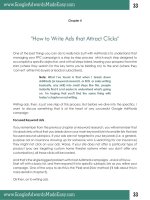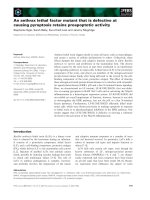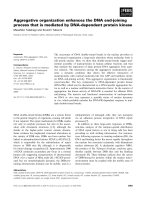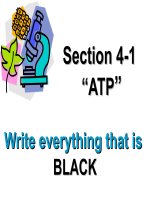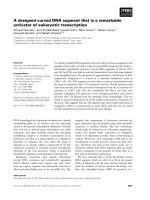Section 4-1 " ATP " write everything that is Black
Bạn đang xem bản rút gọn của tài liệu. Xem và tải ngay bản đầy đủ của tài liệu tại đây (350.22 KB, 8 trang )
Section 4-1
Section 4-1
“ATP
“ATP
”
”
Write everything that is
Write everything that is
BLACK
BLACK
4.1 Chemical Energy and ATP
4.1 KEY CONCEPT:
4.1 KEY CONCEPT:
All cells need chemical energy.
All cells need chemical energy.
4.1 Chemical Energy and ATP
The chemical energy used for most cell
The chemical energy used for most cell
processes is carried out by ATP
processes is carried out by ATP
(adenosine triphopshate)
(adenosine triphopshate)
Starch molecule
Glucose molecule
•
Molecules in food store chemical energy in their bonds.
Molecules in food store chemical energy in their bonds.
4.1 Chemical Energy and ATP
phosphate removed
•
ATP transfers energy from the breakdown of
ATP transfers energy from the breakdown of
food molecules to cell functions.
food molecules to cell functions.
–
Energy is released when a phosphate group
Energy is released when a phosphate group
is removed.
is removed.
–
ADP is changed into ATP when a phosphate
ADP is changed into ATP when a phosphate
group is added.
group is added.
4.1 Chemical Energy and ATP
Organisms break down carbon-based
Organisms break down carbon-based
molecules to produce ATP
molecules to produce ATP
•
Carbohydrates
Carbohydrates
are the most commonly
are the most commonly
broken down to make ATP
broken down to make ATP
–
not stored in
not stored in
large amounts
large amounts
–
up to 36 ATP
up to 36 ATP
from one
from one
glucose
glucose
molecule
molecule
triphosphateadenosine
adenosine diphosphate
tri=3
di=2
4.1 Chemical Energy and ATP
•
Fats
Fats
store the most energy
store the most energy
–
80 percent of the energy in your body
80 percent of the energy in your body
–
about 146 ATP from a triglyceride
about 146 ATP from a triglyceride
•
Proteins
Proteins
are least likely to be broken
are least likely to be broken
down to make ATP.
down to make ATP.
–
amino acids not usually needed for energy
amino acids not usually needed for energy
–
about the same amount of energy as a
about the same amount of energy as a
carbohydrate
carbohydrate
4.1 Chemical Energy and ATP
Chapter 4 Booklet
Chapter 4 Booklet
1.
1.
You are going to get 2 pieces of paper and fold them
You are going to get 2 pieces of paper and fold them
in half like a book!
in half like a book!
2.
2.
The front page is the title page! Write on this page
The front page is the title page! Write on this page
CELLS & ENERGY.
CELLS & ENERGY.
Come up with some type of
Come up with some type of
picture for the title page.
picture for the title page.
3.
3.
Open the book up and number the pages 1-7.
Open the book up and number the pages 1-7.
4.
4.
We will staple the spine to keep it all together.
We will staple the spine to keep it all together.
4.1 Chemical Energy and ATP
Page 1 & 2
Page 1 & 2
1.
1.
Page 1: Title:
Page 1: Title:
ATP
ATP
(write down the following then
(write down the following then
transfer on to your booklet on page one.)
transfer on to your booklet on page one.)
-Define ATP
-Define ATP
-Define ADP
-Define ADP
-How are ATP & ADP alike?
-How are ATP & ADP alike?
-How are they different?
-How are they different?
2.
2.
Page 2: Title:
Page 2: Title:
ATP & ADP
ATP & ADP
-Draw, Label, & COLOR Figure 4.2 on page 101
-Draw, Label, & COLOR Figure 4.2 on page 101
